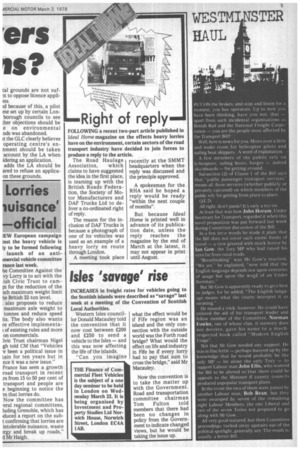WESTM S STER HAUL
Page 7

If you've noticed an error in this article please click here to report it so we can fix it.
!JUT ON the brakes,. and stop and listen for a moment, you bus operators. Up to now you have been thinking, have you not, that — apart from such incidental organisations as British Rail and the National Freight Corporation — you are the people most affected by the Transport Bill?
Well, here is news for you. Move over a little and make room for helicopter pilots and sailing boat skippers. A word of explanation. • A few members of the public rely on helicopters, sailing boats, barges — indeed skateboards — for getting around.
Subsection (2) of Clause 1 of the Bill says that "public passenger transport services means all those services (whether publicly or privately operated) on which members of the public rely for getting from place to place.
Q.E.D.
All right, don't panic! It's only a try-on.
At least that was how John Horam, tinder Secretary for Transport, regarded it when this novel proposition was put forward last week during Committee discussion of the Bill.
In a few ter.;e words he made it plain that the Bill does not cover such exotic forifis of
travel — a view greeted with muck horror by Ian Gow. the Tory MP who had raised his eyes far from rural roads.
"Breathtakingwas Mr Gow's reaction. "We are," he explained, "now told that the
English language depends not upon centuries of usage but upon the wocd of an Under Secretary."
But Mr Gow is apparently ready to give best to judges, for he added, "The English language means what the courts interpret it as meaning."
He missed a trick. however. He could have enlisted the aid of his transport leader and
fellow member of the Committee, Norman Fowler, One of whose clan, if memory does not deceive, gave his name to a muchrespected book called "Modern English Usage".
Not that Mr Gow needed any support. He was in fine fettle — perhaps buoyed up by the knowledge that he would probably be the
only MP — let alone the only Tory — to support Labour man John Ellis, who wanted
the Bill to be altered so that there could be appeals to the Minister if county councils produced unpopular transport plans.
In the event the two of them were joined by another Labour man, Bob Bean. but they were swamped by seven of the remaining eight Labour Members, the one Liberal and two of the seven Tories not prepared to go along with Mr Gow.
All very good-natured. but then Committee proceedings, tucked away upstairs out of the political spotlight, generally are. The result is, usually. a better Bill.
































































































































































